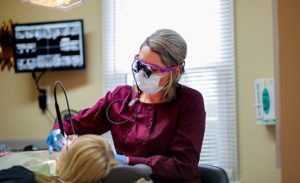“IT’S JUST A CLEANING”
December 16, 2024
 This is a phrase we hear far too frequently when patients call to cancel or change their dental hygiene appointments. When the patient is told that there are no open hygiene appointments for 4-6 months, the response is often, “Oh, that’s okay, it’s just a cleaning.” This lack of concern is only partly to blame on the patient; most of the accountability falls in the lap of the dental team.
This is a phrase we hear far too frequently when patients call to cancel or change their dental hygiene appointments. When the patient is told that there are no open hygiene appointments for 4-6 months, the response is often, “Oh, that’s okay, it’s just a cleaning.” This lack of concern is only partly to blame on the patient; most of the accountability falls in the lap of the dental team.
If you read this column with any frequency, I am sure you have seen me report that 75% of the population has some form of periodontal (gum) disease. I’m sure you have also read that periodontal disease has been linked to heart disease, stroke, pre-term, low birth-weight babies, diabetes, and possibly even some types of cancer. The problem is the dental team is not discussing this enough with their patients.
Here’s the way I see it: If a patient has made the decision to seek the services of a dental office, we must assume that the reason is based on wanting to improve and/or maintain their dental health. If that’s not the reason you go to the dentist, what is? Patients will often say during an exam, “Please don’t find anything.” Our response may be, “Well then, I better not look.” Assuming the reason for going to a dental office is to improve and/or maintain dental health as part of overall health, it is the obligation of the dental team to “find stuff” if it’s there, communicate that with the patient, and have a conversation about whether any steps should be taken.
For example, based on your level of periodontal health, there are different levels of frequency recommended for hygiene visits. The majority of patients should be seen every 6 months. Some are lucky enough to have yearly visits recommended to them. For others, every 3 or 4 months is recommended. This frequency is determined by your dental team to maintain your dental health. Regardless, if you put off your routine care by 1, 2 or even 6 months, that is a lot of time to have bacterial growth accumulate and put your body into a defensive mode due to increased inflammation. This brings me back to the reason you have chosen to be an active dental patient.
Remember, gum disease is not only bad because it makes your breath stink and your teeth fall out; it is bad for you systemically because of chronic inflammation. You may very well not notice an increase in inflammation, but your body does. There are measurable indicators of this.
If your goal is optimal health, routine maintenance is essential. I tell my team all the time that we must continue to educate the people who put their trust in us to maintain their dental health.
Depending on your car, there is a recommended maintenance schedule. If you ignore the recommended maintenance, only bad things can happen. You may be able to “stretch it out” a little, but must understand there are risks associated with that decision. If you knew how bad chronic inflammation really was for you, you would want to be seen more frequently than you are.
There are obviously valid reasons why patients need to change an appointment. Most dental offices understand that. It is the frequency, attitude (It’s just a cleaning), and lack of commitment that causes both disruption within the dental office and discontinuity of care.
Dr. St. Clair maintains a private dental practice in Rowley dedicated to health-centered family dentistry. He has a special interest in treating snoring, sleep apnea and TMJ problems. If there are certain topics you would like to see written about or questions you have please email them to him at jpstclair@stclairdmd.com
THE ORAL/SYSTEMIC LINK 3/3
December 2, 2024
 If you missed Part 1 and/or 2 of this series, you can find it at www.thetowncommon.com.
If you missed Part 1 and/or 2 of this series, you can find it at www.thetowncommon.com.
The past couple weeks have been about the growing evidence that links oral and systemic disease, and the need for more collaboration between dentists and physicians. All of this, of course, is in the best interest of the patient.
The body is a complex system – and everything is connected. The health status of an individual’s mouth can absolutely play a role in systemic health or disease. In addition to the need for dentists and MD’s to collaborate more on the oral/systemic connection, we also need to collaborate better about our patient’s sleep problems.
As part of a comprehensive approach to care, we screen for sleep issues with our patients. It amazes me how many people have issues with their sleep. It amazes me even more when I learn that many of these people have never even had a conversation with their doctor about sleep. Experts in sleep medicine agree that there is much room for improvement in this vital part of our health care.
Periodontal issues and sleep are just two areas where more information should be shared between dentists and physicians. We have to be open to the fact that everything is connected, and needs to be taken into consideration when we are trying to diagnose, monitor, or solve our patient’s problems.
I recently saw someone who has been a patient of mine for about 7 years. I noticed in the patient’s notes that bruxism/grinding had been discussed at most hygiene appointments in the past, due to the noticeable wear patterns on the patient’s teeth. There was also a note in the chart several times stating that the patient would never wear a dental appliance at night.
As I did my exam, I kept thinking to myself that there must be more to the story behind this patient’s dental issues. It happened to be around our lunch break, so I asked the patient if she had a few minutes for us to talk. She seemed interested in what I had to say. I photographed her teeth to compare them with photos taken 7 years ago. We talked for an hour.
Aside from learning that the patient was on (7) medications for the past SEVEN years and had never reported any of them to us, I also learned that the reason she was also resistant to wearing something to protect her teeth at night was because she had sleep issues. She felt there was no way she could handle the extra stuff in her mouth. I also learned that both of her parents are treated for sleep apnea.
So, here are some bullet highlights from the past 3 weeks:
- Periodontal (gum) disease is bad. Just because it doesn’t hurt doesn’t mean you don’t have a problem. If you care about your general health, you must take care of your mouth.
- Delaying care of dental problems always leads to more treatment and more cost.
- Don’t leave information out when discussing your health with your doctors. Everything is important.
- For better patient care, doctors and dentists should have more collaboration.
- Time is the most precious gift a health care provider can give their patients.
Dr. St. Clair maintains a private dental practice in Rowley dedicated to health-centered family dentistry. He has a special interest in treating snoring, sleep apnea and TMJ problems. If there are certain topics you would like to see written about or questions you have please email them to him at jpstclair@stclairdmd.com







